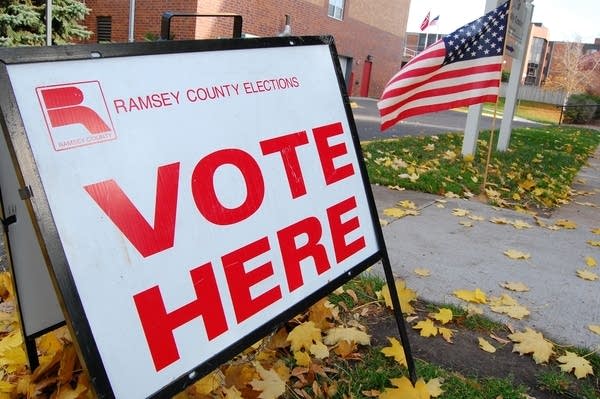Judge voids some Minn. campaign spending rules
Go Deeper.
Create an account or log in to save stories.
Like this?
Thanks for liking this story! We have added it to a list of your favorite stories.

A federal judge has declared that Minnesota's restrictions on independent expenditures on behalf of political candidates by corporations are unconstitutional.
U.S. District Judge Paul Magnuson issued the ruling Friday in a lawsuit filed by the Minnesota Chamber of Commerce.
The Chamber sued to assert its rights following a U.S. Supreme Court decision in January that struck down similar restrictions on the federal level.
Mike Franklin with the Minnesota Chamber says businesses want to be sure the law is clear as the campaign gets underway.
Turn Up Your Support
MPR News helps you turn down the noise and build shared understanding. Turn up your support for this public resource and keep trusted journalism accessible to all.
"It's not as if we had a plan just ready to go after this decision came down. We'll have to sit down and talk about a way to now participate in a responsible, independent campaign," said Franklin. "This election is going to be one of great consequence for businesses in Minnesota, so that'll be the next step trying to figure out what that looks like."
Common Cause Minnesota issued a statement saying it's concerned about what will happen in the upcoming election cycle, and asking for the Legislature to require greater disclosure of political expenditures and contributions.
"Without legislative action, the court's decision will create a wild west of corporate spending in political campaigns," said Mike Dean, executive director of Common Cause Minnesota. "The Legislature must act to prevent the chaos caused by this decision."
If the Legislature fails to act this session, the group predicts there will be a series of lawsuits filed that will cause more confusion around Minnesota's campaign finance rules.
During a hearing Judge Magnuson held on the case last month, Chamber attorney Thomas Boyd argued the law chills the business advocacy group and its members from exercising their free speech rights out of fear of penalties that include heavy fines, possible imprisonment and even dissolution of corporations.
Ramsey County Attorney Susan Gaertner had already said she wouldn't prosecute the Chamber for the kind of political activities it said it wants to pursue.
But Assistant Ramsey County Attorney Kevin Lindsey urged the judge not to declare the statutes unconstitutional, saying they regulate activities beyond those deemed protected speech under the Supreme Court ruling.
Boyd said it wasn't good enough that Gaertner, who isn't running for re-election this fall, pledged not to prosecute the Chamber. He said prosecutors in other counties might decide otherwise.
"The current county attorney cannot bind her successors. ... This county attorney cannot bind all of the other county attorneys," he said.
The legal language at issue prohibits corporations from making independent expenditures to promote or defeat political candidates, or directly or indirectly to political parties for the same purposes. Independent expenditures are defined as spending not coordinated or approved by the candidates.
During the hearing, Judge Magnuson raised the hypothetical possibility that some prosecutor could seek to draw headlines by calling for the dissolution of a big company such as Medtronic for its political spending.
"Like it or not, county attorneys are elected positions, and while maybe nonpartisan in a sense, they are political," Magnuson said.
The Chamber is not seeking the right to make direct contributions to candidates. But it says it specifically wants the freedom to spend in support of candidates by taking out print, TV, Internet and billboard ads; posting endorsements on its website, using its blog to post messages of support; sending letters to local businesses in support of candidates; holding rallies and setting up phone banks.
"They are well within their rights to do so," Lindsey said.
But Boyd said Gaertner's pledge not to prosecute might not apply to some newer forms of campaigning that the Chamber didn't list in its briefs, such as social media, that it or other groups and corporations might someday decide to use.
The U.S. Supreme Court's decision, handed down in January in a major case known as Citizens United, threatened spending restrictions in effect in some 24 states at the time.
Based on that ruling, a federal judge in California in February ordered San Diego to drop its city election contribution limits. And last month the Republican Party asked the U.S. Supreme Court to take a step further and allow parties to raise unlimited contributions from corporations, unions and others.
The Chamber named Gaertner in its lawsuit because the group is headquartered in St. Paul, so the Ramsey County attorney's office likely would be responsible for prosecuting it.
(Copyright 2010 by The Associated Press. All Rights Reserved.)
Dear reader,
Your voice matters. And we want to hear it.
Will you help shape the future of Minnesota Public Radio by taking our short Listener Survey?
It only takes a few minutes, and your input helps us serve you better—whether it’s news, culture, or the conversations that matter most to Minnesotans.




